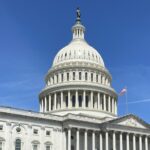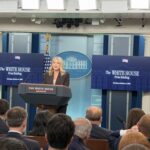WASHINGTON — After forty-two weary days that brought the machinery of government to a grinding halt, stranded thousands of federal workers without pay, and grounded nearly half the nation’s air traffic, the longest government shutdown in U.S. history appears finally to be nearing its end.
But the uneasy truce struck in the Senate on November 11 — brokered by a handful of centrist Democrats and embraced by a White House desperate to restore normalcy — has left deep scars on both parties and set the stage for a bruising political reckoning in the months ahead.
The Senate’s passage of a stopgap measure to fund the government through January 30 offers only a temporary reprieve. It reverses more than 4,000 federal layoffs ordered during the crisis and ensures that employees will be paid retroactively.
Yet the measure conspicuously avoids the central issue that ignited the standoff: the expiration of pandemic-era tax credits under the Affordable Care Act (ACA). Millions of Americans are expected to face higher premiums when the subsidies lapse at year’s end, and Democrats — who had vowed not to reopen the government without securing an extension — are struggling to justify their retreat.
Democrats Divided, Base Disillusioned
For Senate Democrats, the decision to reopen the government without concrete concessions from Republicans has sparked fury within their ranks and disbelief among progressive activists. “If you’re not going to fight to stop premiums from hiking for millions of Americans, then how are you going to fight for our basic values?” said Representative Ro Khanna of California, one of several Democrats demanding new leadership after the deal.
Senate Minority Leader Charles E. Schumer of New York and House Democratic Leader Hakeem Jeffries opposed the compromise, insisting that Republicans now “own” the political consequences if health care costs spiral. Yet seven Democratic senators and one Democratic-leaning independent broke ranks, citing mounting economic pain and public frustration with the stalemate. Some are retiring; others are years away from reelection.
For Schumer, the revolt underscored his fragile grip on a party struggling to balance moral conviction with political pragmatism. Democrats had entered the shutdown confident that public opinion would favor them, buoyed by recent electoral wins and polling that blamed Republicans for the crisis. But as weeks stretched into months and flight delays piled atop furloughs and backlogs, the political calculus shifted.
An Economist-YouGov survey last week found blame nearly evenly split between the two parties: 36 percent faulting Republicans, 34 percent Democrats, and 24 percent both equally. The erosion in Democratic support was unmistakable — a sign that the party’s gambit to pressure Republicans into protecting the ACA had backfired.
Republicans Claim Tactical Victory, Face Strategic Risk
President Donald Trump was quick to celebrate what he called a “total win” on Fox News. “Schumer thought he could break the Republicans, and the Republicans broke him,” he gloated. But inside GOP circles, the victory lap was tempered by unease. Republican strategists acknowledge that the party’s resistance to extending ACA subsidies could haunt them heading into next year’s midterms.
A memo by Trump campaign pollster Tony Fabrizio warned months ago that allowing the tax credits to expire would be “political suicide” in key battlegrounds, where millions depend on subsidized coverage. A KFF poll released last week found that three-quarters of Americans support extending the credits — and that most would blame Republicans if premiums soar.
“Once you give someone something and you take it away, it’s politically difficult,” said Patrick Sebastian, a Republican strategist from North Carolina. “Democrats got nothing from dragging out the shutdown, but Republicans will own the fallout if people start losing coverage.”
Even some Trump allies are sounding alarms. Representative Marjorie Taylor Greene of Georgia, once among the former president’s most ardent defenders, has publicly complained about constituents “who will not be able to afford health insurance if these credits vanish.”
Turbulence in the Skies and on Capitol Hill
The government’s paralysis was visible not only in shuttered offices and idle parks but in the skies above. The Federal Aviation Administration’s announcement last week that it would cut flight capacity by up to 10 percent at 40 major airports — citing a shortage of air traffic controllers caused by the shutdown — triggered cascading delays and cancellations nationwide.
By the time senators struck their deal late Sunday, nearly half of all domestic flights were either delayed or canceled. The chaos even complicated efforts to end the crisis: lawmakers struggled to return to Washington for the decisive vote.
House Speaker Mike Johnson of Louisiana urged members on Monday morning to “begin, right now, returning to the Hill,” acknowledging that air travel had become so unreliable that some lawmakers were driving or even motorcycling back to the capital. Representative Derrick Van Orden of Wisconsin chronicled his 950-mile Harley-Davidson journey through freezing temperatures on social media, blaming Democrats for the gridlock. “Flights are too unreliable,” he said.
Others carpooled across states. “Eight more hours to go!” posted Representative Rick Crawford of Arkansas as his car inched toward Washington amid news of more than 2,000 delayed flights and over 1,200 cancellations nationwide.
The House Battle Ahead
The Senate’s bipartisan vote — 60 to 40 — now sends the measure to the House, where Johnson faces a delicate balancing act. He must corral a Republican caucus split between pragmatists eager to end the shutdown and hard-liners unwilling to grant Democrats even symbolic victories. The White House’s Office of Legislative Affairs has reportedly assured GOP offices that the administration supports the reopening plan, especially the provision protecting federal jobs — the only clause that gave some Republicans pause.
Yet the House’s path remains uncertain. Johnson, who has tied his leadership to fiscal restraint, must contend with an emboldened far-right bloc skeptical of temporary fixes. Democrats, meanwhile, have signaled they will back the measure but insist that the coming debate over ACA subsidies will be a litmus test for bipartisan governance.
The Political Reckoning
The immediate economic relief provided by reopening the government cannot mask the deeper political wounds. Democrats have emerged chastened, their internal divisions exposed, their leadership under scrutiny. Republicans have scored a tactical victory but face growing pressure to act on health care before the subsidies lapse.
Both parties, in short, have lost — only on different timelines. Democrats face the wrath of a disillusioned base now; Republicans may face the voters’ judgment later.
Still, amid exhaustion and recrimination, a flicker of pragmatism has returned to Washington. “We’re disappointed about the outcome,” said Senator Peter Welch, Democrat of Vermont, “but that’s not to suggest there wasn’t some significant benefit to it. We’ve forced Republicans to confront the reality that health care is not a fight they can win.”
For now, the nation’s airports may soon hum again, and federal employees can return to their desks. But the political turbulence that defined this 42-day shutdown — the mistrust, the brinkmanship, the frayed patience of an anxious public — remains. Whether Washington can navigate through it toward a bipartisan horizon, or plunge once again into crisis, may depend on what happens next in the House of Representatives.
As Speaker Johnson put it in his Monday message to colleagues: “We have to do this as quickly as possible.” In a capital still limping back to life, that urgency may be the only sentiment shared on both sides of the aisle.






